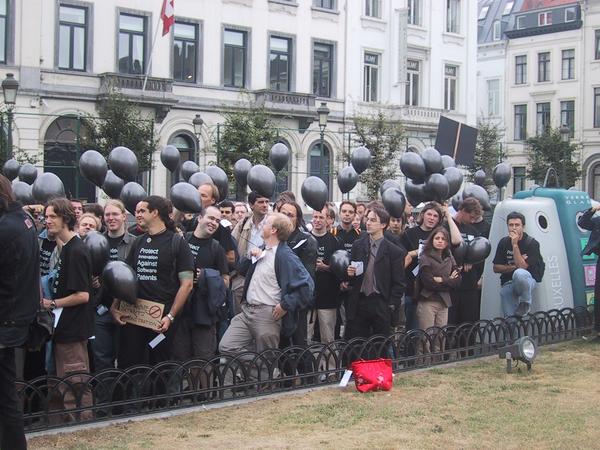Photos: [1] [2] [3] [4]
Audio: Richard Stallman of GNU project speaks on software patents in Cambridge UK [mp3][ogg][text]
Text: [1][2][3]

Corporate interests threatened by multiple forms of online sharing are utilizing a shotgun approach to stem the tide of change: pressures on legislators, dubious legal attacks, arresting programmers, and plans to incorporate surveillance chips in all new Intel-based (Pentium) computers from 2005 in order to ensure "security" for users. In a look at recent tactics on the legislative front, Cambridge University academic Ross Anderson has prepared a briefing paper on the Draft Intellectual Property Rights Enforcement Directive.
As part of a drive to blunt the impact of competition from Open Source / Free Software, and the revenue impacts from file sharing, an unholy alliance of software giants, microchip makers, and media corporations has come into being. The picture is complicated by the fact that although the ranks of the ideologically righteous swell on a daily basis, a number of large corporations, in the process of being crushed under the wheels of the Microsoft juggernaut, have turned to the GNU/Linux community for salvation and free code, and have placed Open Source software technologies at the heart of their business.
Suggested Action
Concerned software users and developers are asked to sign the Eurolinux Alliance petition and call their MEPs as soon as possible. Other suggested actions are listed here.
Background Information: What are software patents?
Despite its widespread use in the press, the term 'intellectual property' serves to confuse issues more than it clarifies them. Under current laws, intellectual property as a category does not exist - copyright and patents do exist. Copyrights and patents are quite different from each other. Copyright is the legal right granted to an author to exclusive publication, production, sale, or distribution of a literary, musical, dramatic, or artistic work, or technical work. Legally, a copyright arises when a work is created, and it applies to the implementation of a specific work, for example, the writing and recording of a song. Patents, on the other hand, are grants made by a government that confers upon the creator of an invention the sole right to make, use, and sell that invention for a set period of time. A patent restricts the use of an idea; copyright restricts the implementation of an idea. This is confusing, so consider an analogy from the world of music.
Johnny Cash presumably holds the copyright to the song "Burning Ring of Fire"; consider what would happen if patents had applied to music in the same way as they are being proposed for software under the IPR Enforcement Directive. It would be possible for a large music corporation to patent "music consisting of a 2/2 shuffle rhythm, sung in a monotone voice with tex-mex horns on the backing tracks", and Johnny would have been sued for breach of patent whenever he picked up his guitar. No corporation has yet bothered to push for patents on musical ideas, because there are no issues of enough political or economic importance to drive them to it. In the world of software, things are quite different. For example, although it would be politically very difficult to try to enforce its patent rights, British Telecom has since 1976 held a patent on the use of hypertext in conjunction with phone lines. That is, BT claims that it has a patent on the world wide web when it is accessed via dial-up.
Other dubious patents set to be legalized by the EU Parliament include things like "progress bars", "mouseclicks on online order forms", and "scrolling within a window." Having to pay patent royalties to companies for these alleged "innovations", many of which have been in common use or decades, would destroy the Open Source / Free Software commuity, devastate self-employed programmers and small sofware companies, and hand gigantic software companies, many of which already hold thousands of patents, complete control of all software development for the foreseeable future.
 e-mail:
e-mail:
Comments
Display the following 5 comments